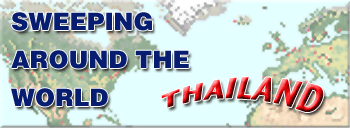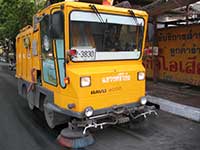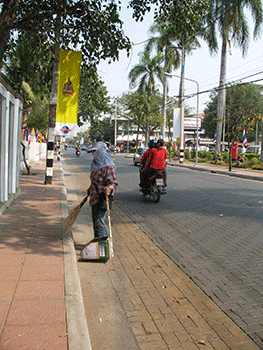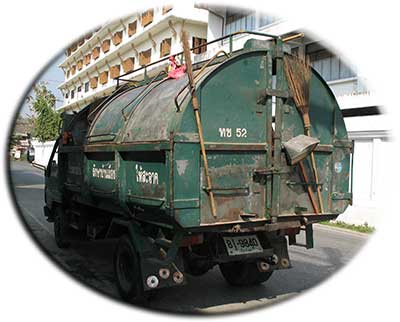
 |
Street Sweeping in Chiang Mai, Thailandby Ranger Kidwell-RossCleaning the City of Chiang Mai
I learned the main streets and 208 side streets contained within Sri Wichai Quarters are kept clean via a complement of 60 sweeping personnel and three mechanized sweeper trucks. Two of these are like the one shown. I was never able to get a handle on, or photo of, the other machine. The total area covered by the sweepers in this quarter of Chiang Mai is 9.2 km sq. The three mechanized sweepers in this sector handle sweeping in the more highly trafficked and congested areas that are better suited to machine sweeping. Although the city uses air sweepers, that appears to be driven more by debris size than by other factors. Plus, air sweepers have a lower consumables rate than do mechanical broom machines. In Thailand there is, of course, nothing like a Spring cleanup to ever contend with. 
A complement of 140 people work in this portion of Chiang Mai. Sixty of those are the manual sweeping personnel who are on the street daily -- yes, seven-days-per-week -- doing their job. Some of these handle scheduled routes on the typical time schedule. For these sweeping employees, their work day starts at 5am. They work for two hours, until 7am, then must take an hour-long break. Starting back up at 8am, they work to 11am before taking a two-hour break. Then, starting back at 1pm, they work until 3pm. For this level of effort the manual sweeping personnel were paid, in 2007, 5,200 Thailand Baht per month. At the exchange rate at the time, which was about 35B to $1US, this came out to just under $150US per month. The base pay for those driving the sweepers is somewhat higher, at 7,200B. Overtime is an additional 100B for up to 3 hours per day, and an additional 200B is paid to those working on Sunday. If your sweeping company is based in the U.S., this pay scale may be something you'll want to post on the wall! 
According to the civil service laws of Thailand, just government workers get a pension. Since manual sweeping personnel are not classified as government workers, they also don't receive pensions when they retire. On the other hand, there were some 'perks' to where this particular worker was sweeping: She was quite near a beautiful Buddhist shrine. (The previous link also includes links to two slideshows showing some of the typical scenes of Thailand.) The problem of debris, both on the street and elsewhere, becomes much larger during the tourist 'high season.' The sheer volume of material makes it difficult for the city to manage the volume of garbage. Perhaps this is the reason why garbage cans are extremely hard to find throughout the city.
I was told that the city is constructing a paper, plastic, food and bottle recycling center. Planned for completion in June, the impetus is that the city will then be able to sell some amount of the debris stream -- which has historically just been combined garbage that had to be land-filled -- to private companies.
Although there may well be others, the only recycling bins I spotted in the area were on the drive up Suthep Mountain to the overlook areas above the city. No doubt the frequency and number of these will increase once recycling center is completed. Even garbage cans are in short supply throughout the town, but find out why was a concept that I couldn't get answered due to the language barrier. The city is only just starting to teach its citizens conservation techniques, including how to protect the environment and to reduce the amount of pollution in the air. The current plan is to arm the citizens with knowledge that, it is hoped, they will use to empower a movement for change. For example, a competition has been started to protect the existing trees within the city. The tree conservation programs include stories about the old trees. Information about conservation is also being inserted within the stories of legend that are told from generation-to-generation. I saw many new trees being planted even in the week I visited. Although the sweeping program for Chiang Mai is vigorous, efficient and multi-faceted, the city seems to still sweep largely for cosmetic results. Because of the high level of tourism Chiang Mai enjoys, city officials do see the merit of keeping the city at a cleanliness level that will continue to attract those used to Western sanitary conditions. Because of the air pollution created by vehicle exhaust and the other factors discussed in the previous stories, it will probably be some time before Chiang Mai has the fiscal luxury of linking sweeping frequency to a reduction in stormwater runoff pollution. Now that contact has been made, I look forward to working with city officials in this regard when I visit Chiang Mai the next time. We invite you to check out our two online slideshows of Thai culture, as well as a Quicktime video showing traffic at a busy intersection. 
Ranger Kidwell-Ross is editor of WorldSweeper.com, and the world's most prolific writer on the topic of power sweeping. In addition to the U.S., he has written stories about sweeping in many other parts of the world. If you have questions or comments, please let us know.
|